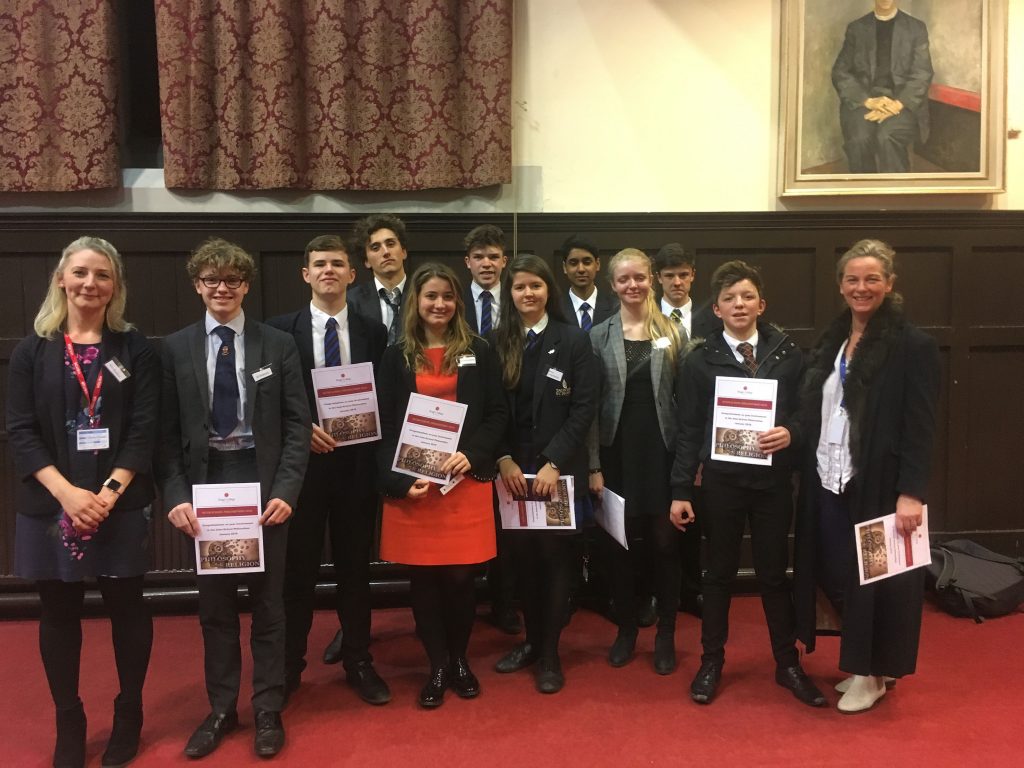Philosophy is almost certainly the broadest academic subject, containing elements of History, Classical Civilisation, Theology, Science, Art, Music and Drama among others, and in many cases, inspired the development of many of the aforementioned disciplines. In studying philosophy, one attempts to get to the bottom of the most simple and the most complex questions, but also attempts to question the status quo. You might wonder why so many people are so invested in such an ancient subject, but the answer lies in its name. In Ancient Greek, the word ‘philosopher’ directly translates to ‘lover of wisdom’, which is precisely what Taunton School Philosophy students are – lovers of wisdom. It is these students who fully understand that such a vital and diverse subject must be studied in order to fully understand the complexities of the modern world.
A result of this inquisitive nature has led Taunton School to attend the Inter-School Philosothon at King’s College for the fourth year running. A Philosothon is a friendly (yet competitive!) event in which a group of students from different schools discuss philosophical ideas to arrive at a consensus about the ethical issue at hand. Of course, being a competition, the participants are scored for the quality of their arguments, their ability to engage in discussion and their ability to forward the thinking of the team. Ten students from Taunton School, two from each year group, were invited to go this year and, as ever, all enjoyed it. Much like in previous years, the philosophical issues raised encouraged detailed debate and developed discussion and went so far as to alter the viewpoints held by our students. The participants were divided into ten groups (each one named after an influential philosopher) that discussed the philosophical and ethical importance of four topics which provoked zealous debate.
Round One began with an extract from Kahlil Gibran’s book, ‘The Prophet’, entitled ‘On Charity and Giving’. While initially not perceived as an issue [the good of giving to charity is immediately obvious], it became contentious when questions such as “Why should you feel pressured to give away the money you’ve worked hard for?” and “Are the best things in life free?” emerged, with the discussion generally veering off topic and stretching to debates of capitalism versus communism. Of course, this is still relevant to the topic as the political views of each person will inevitably determine how much they are prepared to donate, and to whom. Indeed, the whole notion of charity raises questions of who should receive the benefit, how much should be donated, whether focus should be placed on local or global charities and whether only the deserving should receive it. This controversy was certainly reflected by the veracity of our debates. In my group in particular, we took a fairly right-wing stance and agreed that those who inflict the trauma on themselves, such as smokers who trigger their lung cancer, should not be treated at the expense of others but should suffer the burden themselves, coming to the overall conclusion that charitable benefit should be merited.
Our second topic of inquiry was based on Lydia Howard Sigourney’s, “The Camel’s Nose”, detailing a camel entering a shop and emphasising how once its entry has begun, it cannot be stopped. This is, of course, a metaphor for the slippery slope argument, which was exactly the focus of our discussion in Round Two. A slippery slope argument demonstrates that by allowing something once, that act will inevitably lead to practices that are highly undesirable. A widely-used analogy is that of a snowball; rolling it down the snowy hill causes snow to attach to the snowball which causes a sharp increase in size. The whole notion of a slippery slope can be applied to almost any argument, but in most cases, it does tend to reduce the credibility of the points being put forward. Nonetheless, it does make for interesting ethical conundrums! The groups discussed the issues of, and applied the slippery slope, to euthanasia, “Don’t knock it ‘til you’ve tried it!”, “Once a cheater, always a cheater” and designer babies. The potential problem of designer babies was by far the most compelling issue, but some fell down the rabbit hole and concluded that allowing one parent to pick their unborn baby’s characteristics would create a dystopian future whereby all children will be perfect Aryan specimens. The irony of these ideas seem to have been lost to many…
The topic of the Third Round, “Do animals feel pain?”, was the most controversial of the evening, with the participants’ personal views clearly shining through and dominating discussion. An extract from Kenneth Graham’s ‘Wind in the Willows’ was used as stimulus material, which as ever, sparked furious debate. Initially, our group discussed why some animals are treated far more humanely than others, evident in the obvious distinction between mere insects and man’s greatest friend. The answer that we gave was that the kindest treatment is afforded to those animals that share the most characteristics with humans, such as apes and large cats and dogs. Predictably, the discussion shifted its focus to issues surrounding animal rights, but the dialogue was still interesting and still provocative. Medical research and the problems associated with it came out to be a divisive sub-topic, and many, like myself, argued that because of the benefits that it provides, apparent through a cost-benefit analysis, animal testing is both effective and necessary. But the central question in this discussion was “should we become vegetarian or vegan in order to save animals from unnecessary suffering?”, and with one vegan in the room, the conversation was intense. By taking a utilitarian approach, we agreed (all bar one) that veganism hinders progression and eating meat fuels our world – a bold and controversial statement, but probably true.
The principle of libertarianism was developed by John Stuart Mill in his book, ‘On Liberty’, where he argued that “The only purpose for which power can be rightfully exercised over any member of civilised community, against his will, is to prevent harm to others”. His liberty principle has been controversial since its introduction as, although most believe that they should have a certain degree of freedom within their country, many would argue that a society completely lacking governance would be chaotic, and even anarchic. However, others would attest that society should be governed autocratically, removing power from the people and living at the will of the leader, a situation reminiscent of pre-1917 Russia. We spent the majority of our discussion time debating whether we actually have freedom of speech, or whether it is just a long-lost and idealistic dream. So, do we have freedom of speech? Well, to be frank, the answer is no. We came to the conclusion that in modern Britain (and in many other countries), our freedoms of speech and expression are severely limited by the state in order to create a society where everything is deemed acceptable. This is rather ironic considering my initial statement, but our freedom of expression is strictly limited to praise and acceptance as criticism and disapproval are generally condemned by the populace. John Mill would support this view and would certainly express his desire for total freedom of speech.
This was Taunton School’s most successful Philosothon to date. We came third overall, beating many of our rivals to attain the bronze-medal position. Of course, thanks must go to King’s College for hosting another wonderful event (including a strong supper!), to Mrs Wreford and for organising the trip, and to Ms Smillie for transporting our team, and to our team: George Knowles, Woody Knight, Adi Sharma, Ben Jackson, Mimi Longchamp, George Clark, Constanza Azzini, Andrei Akimov, Cassie Grace and Edward Shattock, for all putting up a stellar performance and getting Taunton School on the podium! A real tribute to the growing importance and influence that Philosophy has on our world.
Edward Shattock
Year 13 Tennis Scholar





